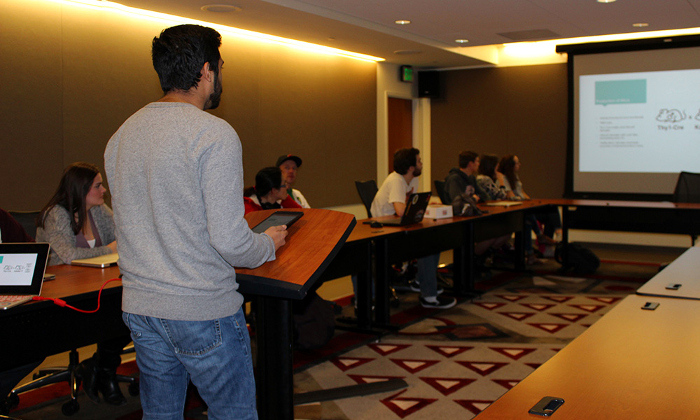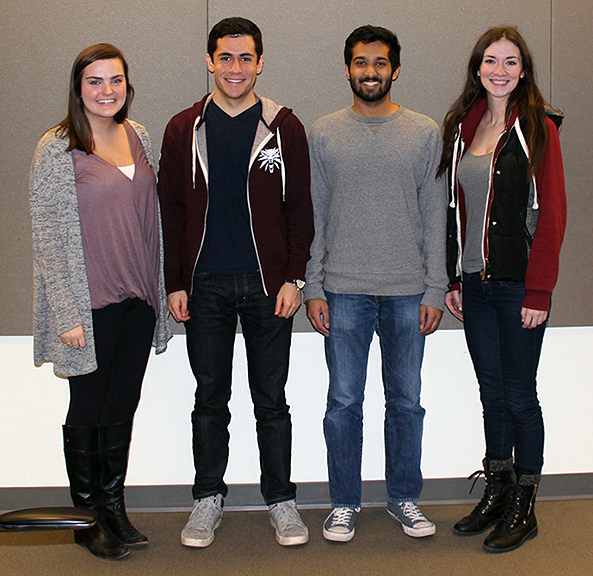Undergraduate Research Club the newest way to get involved in research
MEDIA: Shelley Pressley, Director of the Office of Undergraduate Research, WSU Undergraduate Education, 509-335-5443, spressley@wsu.edu
Emma Epperly, Communications and Marketing Junior Assistant, WSU Undergraduate Education, 509-335-9458, UCHCCommMar.5@wsu.edu
By Emma Epperly
PULLMAN, Wash.—Are you interested in studying DNA, examining the origins of a social issue, or composing a symphony with a faculty mentor? Washington State University’s newest registered student organization (RSO) is for you. It’s called, simply, the Undergraduate Research Club (URC) and it already has 20 members from several majors across campus.
 Irfan Hossain presents to the URC at March 2 club meeting.
Irfan Hossain presents to the URC at March 2 club meeting.
The URC began in spring 2016 to fill many needs, says president Jordana Dahmen, a junior biology major. Members will enjoy an environment that encourages networking and support, where people can discuss and share their research. The club is not just for those already involved in research, students open to becoming involved can use URC as a first step towards research. Officers plan to arrange lab tours, host speaker panels on various aspects of research, and stage developmental workshops. The club will have meetings year round so it’s as accessible as possible, and will have varied meeting times to accommodate students’ busy schedules. Finally, members will learn how to bridge any gaps— perceived or real—between students and WSU’s renowned research professors, who often serve as mentors to undergraduates.
Support from WSU Undergraduate Education
Every RSO must have a faculty advisor, and URC’s is Shelley Pressley, assistant research professor in the Dept. of Civil and Environmental Engineering. She is also the director of the WSU Office of Undergraduate Research, part of WSU Undergraduate Education. While pursuing her undergraduate degree in civil engineering at Carnegie Mellon University in Pittsburgh, she did research herself—but not until her junior year.
“My first project was to examine the use of tire chips for back-fill on roadway surfaces, and I really enjoyed the experience but it came so late in my college career,” said Pressley. “If I had been in a club like the URC it would have led me to pursue research earlier. It would have been nice to have somewhere to talk about or present my research. I know it would have motivated me to continue researching.”
Open to all majors
Pressley is the first to stress that “research” is the catch-all name given to pursuits undertaken by students in all kinds of majors, not just those in white lab coats. “In our office, and throughout academia, the definition of research also includes ‘scholarship and creative activities,’ like an in-depth investigation into a scholarly topic or writing an innovative piece of music. The key is to work with a mentor who will help you expand knowledge about a topic or develop a new take on existing information. In short, that means that students in virtually any and every major can be researchers and members of the URC.
URC leadership brings experience
 The URC officers. From right to left: Alexis Fuller, Armin Rahimi, Irfan Hossain, and Jordana Dahmen
The URC officers. From right to left: Alexis Fuller, Armin Rahimi, Irfan Hossain, and Jordana Dahmen
Dahmen started researching in her freshman year, and URC is the second RSO she has launched. When she came to WSU, her sister, Jessamyn, was already involved in research. They worked together for a summer undergraduate research program with Diane Cook, Huie-Rogers chair and professor in WSU’s School of Electrical Engineering and Computer Science. Their project focused on gerotechnology, which uses computer tablet games to track the progression of various diseases in elderly persons. That led the Dahmen’s to establish the Broadening Participation in Computing (BPC) RSO.
Dahmen went on to study the clinical utility and health-care applications of wearable technology. Currently, she is working in an exercise physiology and performance lab to test commercially available physical-activity monitors during pregnancy—FitBit-like devices.
“I really love the hands-on aspect of the research I’m doing right now,” she said. “Each new research project I take on helps me to see what I’m truly passionate about and would want to continue researching as a career.”
Dahmen enhanced her research experience by presenting a poster at the 2015 Showcase for Undergraduate Research and Creative Activities (SURCA), attending regional research conferences in her field, and serving as a peer mentor to students for the Office of Undergraduate Research.
It was in that peer mentor program where Dahmen found a community of like-minded individuals who share her passion for research, including two other URC officers.
Armin Rahimi is the new URC vice president and Irfan Hossain is club secretary, both of whom were peer mentors along-side Dahmen. Rahimi is a senior computer science major who investigates energy and heat conservation when running high-intensity calculations or algorithms on computers. Hossain is pursing double majors in computer engineering and neuroscience. His research focuses on genes that cause depression, and how altering gene functions affects the brain.
Alexis Fuller, club treasurer, forged her own path when getting involved in research. Instead of looking for advertised lab openings she simply asked professors if they had space in their labs. According to Dahmen, Fuller emailed as many professors as she could in search of a lab job. “She really took initiative which is an amazing characteristic she can talk about to others who want into the research community,” Dahmen said.
URC supports students to get started, persevere
For students who want to start pursing research, getting started can be the hardest part, Dahmen said, but she wants URC to provide a support system for students wherever they may be in the research process.
“I’ve had so much support from professors and other student researchers. It’s been amazing,” said Dahmen. “I want us to be able to give other people the support they need to find their passion in research, like I have. That’s really why I’m so excited about URC.”
New members benefitting
URC is already making a difference and creating a community for researchers. Freshman biology major Maddie Armstrong first heard about URC through an email sent by Pressley’s Office of Undergraduate Research to students who had indicated at informational sessions an interest in research.
She already has work experience in the lab of Mark Dybdahl, associate professor of animal evolutionary ecology. Their research focuses on New Zealand mud snails and the distribution of clones. Armstrong, like Dahmen, plans to earn her Ph.D. and build a career in research.
“URC just seemed like the perfect fit for me” she said. “I’m just getting started in research, so having experienced researchers in a community like URC to help guide me and give me ideas is great.” Armstrong will be presenting her research findings with her lab partner, Christiana Thomas, at SURCA 2016 in March.
She recently began working in the lab of Paul Nabity, assistant professor of entomology, helping investigate insect induced defensive plant phenotypes.
In the future Armstrong hopes the club will give her the tools she needs to pursue more opportunities.
URC presents opportunities
Connections like the ones Armstrong has already made are why Pressley encouraged Dahmen to start URC.
“We have many opportunities for students involved in mentored research but none quite like this” said Pressley. “The club really gives students a chance to share advice, support each other, find new interests and connections, and network with each other.”
The URC has plans to share opportunities during National Undergraduate Research Week April 11-15. URC officers and members will host an information table in the CUB.
The club has a student involvement website, and interested persons can contact its president at jordana.dahmen@wsu.edu. For more information on undergraduate research, peer mentors, and SURCA, visit undergraduateresearch.wsu.edu